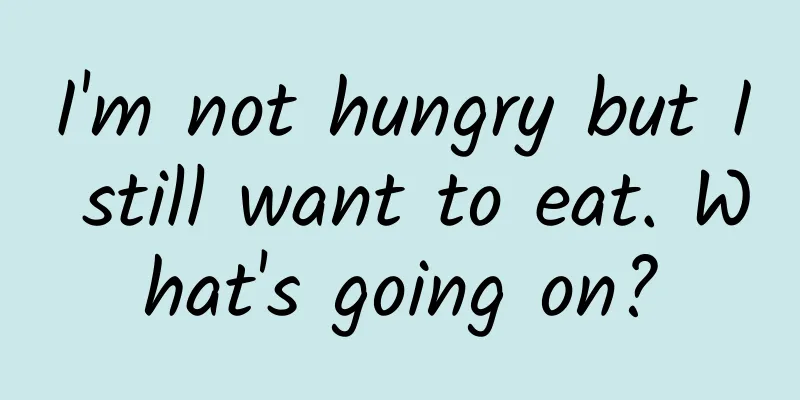I'm not hungry but I still want to eat. What's going on?

|
Review expert: Li Xianhong, national second-level psychological counselor There are many such scenes in life: it is time to go to bed, but you always feel that you need to eat something to make the night complete; or you have just filled your stomach, but your mouth still feels lonely when you encounter other foods; or you have already had a full stomach, but you still tear open the snack bag . All of the above belong to the phenomenon of "hungry mouth but not hungry stomach". Some people think that this is purely because of gluttony, but they don't know that many times, there are many factors controlling your appetite. Source: pexels Your physiology and psychology affect your appetiteWhen people say "I'm hungry", they are often not just physically hungry. "Hunger" can be divided into two types: homeostatic hunger and hedonic hunger . When you feel hungry and feel dizzy, you want to eat something, which is called "steady-state hunger". It is the need for people to eat when they are hungry, and it is the body's simple need for energy and food. As for "hedonic hunger", it generally refers to the "pseudo-hunger" that occurs when there is no need to eat, but due to the desire for food and taste stimulation, it actually reflects the body's desire for happiness and satisfaction. Delicious food has infinite appeal to people, and people need to enjoy themselves by eating delicious food. The reason why steady-state hunger and hedonic hunger appear is precisely the result of the influence of people's physiological and psychological factors. Source: News Photo In the process of evolution, organisms need to take in enough food to ensure the normal functioning of their body functions. Eating when hungry is a very instinctive behavior, which is controlled by the limbic system and hypothalamus of the brain. In the human hypothalamus, there are feeding centers and satiety centers, and there is mutual inhibition between the two. In addition, the amygdala and septum of the limbic system can play a role in regulating feeding behavior. Sometimes we eat more of our favorite foods or go on a diet, and these eating behaviors are largely influenced by the cerebral cortex . At the same time, a variety of neurotransmitters in the brain also affect eating behaviors, but their functions are different. Some will promote eating and make you want to eat more unconsciously, such as norepinephrine and dopamine, while leptin and cholecystokinin will inhibit eating behavior. Source: unsplash In addition to physiological factors, psychological factors also affect human appetite. For example, in life, we may have a special preference for a certain kind of food, which may be due to the cherishment of good times and the commemoration of certain things. To put it another way, our preference for sweets such as cakes is often due to fond childhood memories. For example, when we were young, our parents gave us a piece of cake as a reward for good behavior. This expectation for cake may continue into adulthood. Conversely, some foods that appear in "nightmares" can also reduce our appetite. Why do I always want to eat even though I’m not hungry?After knowing the factors that control appetite, we can clearly answer the question "Why do we want to eat when we are not hungry?" Behind the food addiction is that people want to achieve spiritual and emotional "fullness" by taking in food . At this time, eating behavior is actually a way for people to seek comfort, relieve stress, and reward themselves. Dopamine pathway Source: Baidu Encyclopedia We all know that dopamine in the brain can be said to be a "happiness factor" that affects people's emotions and feelings. If the dopamine concentration in the human body is too low, it may cause depression, obesity, fatigue syndrome, and even attention deficit hyperactivity disorder. If the dopamine concentration increases, it will make people feel happy. Source | "Food Intake Recruits Orosensory and Post-Ingestive Dopaminergic Circuits to Affect Eating Desire in Humans" As a neurotransmitter, the secretion of dopamine is related to eating, sleeping, etc. If you want to increase the secretion of dopamine, the most direct way is to consume high-sugar, high-calorie foods . In this way, the brain's reward system is activated . This is why when people are emotionally distressed, they put "eating a good meal" first. However, since the behavior that activates the reward system is likely to be repeated, it can induce emotional eating, which can easily increase the demand and tolerance for high-sugar foods, forming a vicious cycle. Therefore, when you are in a situation of "wanting to eat even when you are not hungry" for a long time, you should not take it lightly and think that you are just greedy. These will make you want to eat moreThe desire to eat more is sometimes caused by illness . For example, migraine patients may have an uncontrollable desire for chocolate a few minutes or a few days before a migraine attack. Hyperthyroidism can also increase appetite. Thyroid hormone controls the body's metabolism, so if you eat a lot but don't gain weight, and you have symptoms such as fatigue, depression, brittle nails or hair loss, you should be careful about whether you have hyperthyroidism. Of course, insomnia and high stress can also lead to "overeating." Source: pixabay When the human body lacks sleep for a long time, the part of the brain that controls motivation and desire is activated, and the area that makes complex judgments and decisions becomes dull. In this way, even if the body does not need to take in too many calories, the appetite will still be opened. Too much psychological pressure will also make people eat too much, and under the influence of the stress hormone cortisol, "eating" will also become a choice. Source: unsplash Therefore, many times, for health reasons, we need to control our appetite. This is not to promote dieting, but to eat scientifically. For example, to meet the normal needs of three meals a day, choose more healthy, nutritious and filling foods. When you really need to replenish energy, add meals in time. When your appetite is too strong or you experience emotional overeating, you must take it seriously. You can divert your attention appropriately, ensure adequate sleep, or seek help from a professional doctor. |
>>: Summer night, let us look up at the stars
Recommend
Apple hires hundreds of engineers to improve Siri
Apple launched HomePod in the US and other market...
Can you make up for your sleep debt?
For many people, sleeping in on the weekend is on...
How to eliminate inferior products and retain superior ones in APP promotion channel monitoring
Many startups are interested in trying to discove...
The journey to the stars and the sea! ! Review of the development history of the "Shenzhou" series
From 1999 to 2023, from Shenzhou-1 to Shenzhou-17...
up to date! Data rankings of 60 information flow advertising platforms!
Today I bring you the latest traffic rankings of ...
The gorgeous aurora and Jupiter's magnetic field, is there such a connection behind them?
Scientists' new study finds that auroras caus...
Nine suggestions that new APP developers must accept
[[154784]] With the continuous rise of a series o...
The recently popular "Winter Goes and Spring Comes Rice" is really recommended for you to try!
Spring is a season full of vitality and vigor. It...
The activity rate is less than 20%. What is more difficult than attracting new users is awakening dormant users. What can we do?
The cost of attracting new users is getting highe...
How to monetize such a hot e-sports market?
According to conservative estimates of growth rat...
User growth fission method!
“Create 50 communities in 48 hours at zero cost” ...
When it comes to obesity, boys are more concerned than girls! It makes sense...
According to statistics from the World Health Org...
Why do we like spicy food?
Most of the peppers we talk about now come from f...
All the candies and wines you can eat during the New Year's Day are due to him.
Although humans have been making wine for thousan...









